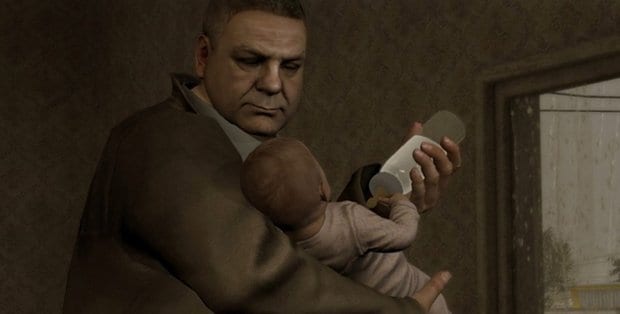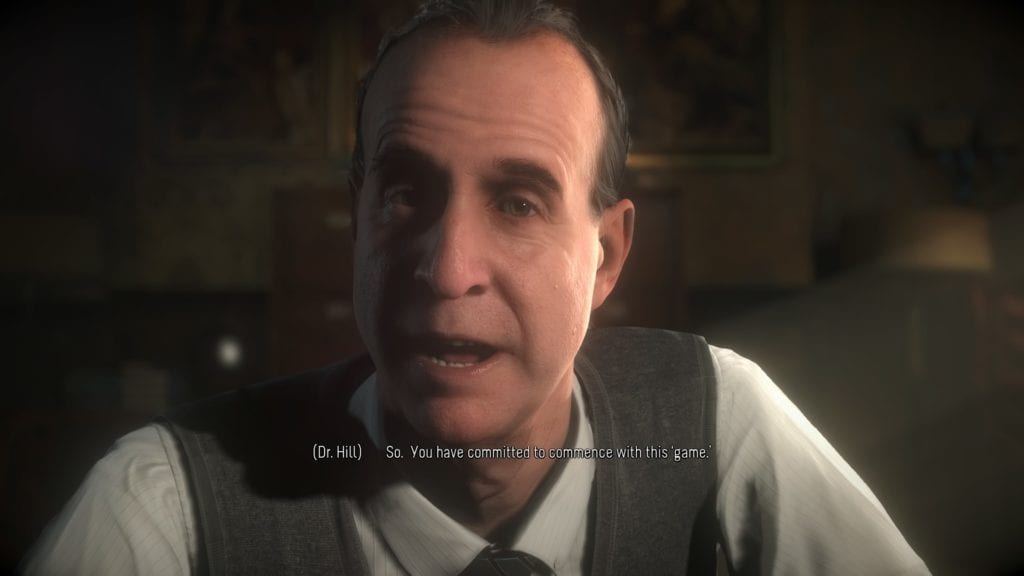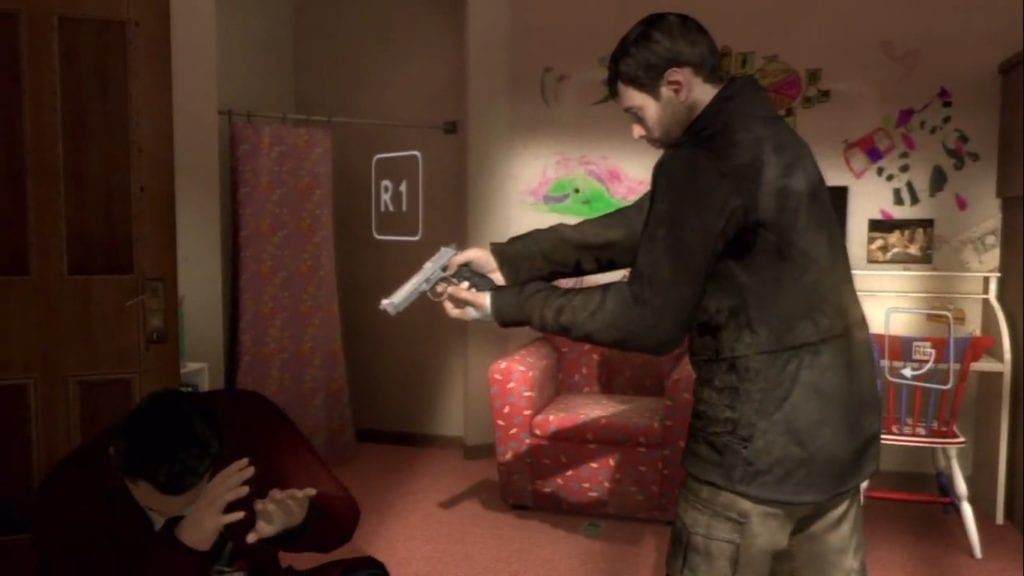(Spoilers for Heavy Rain and Until Dawn).
Once again we return to the well of criticising David Cage. My last article focused on the tendency of sex scenes in Quantic Dream games to descend into unmitigated horror. This one will focus on the more general problem of Cage not being a good writer (in my subjective opinion, of course).
Last time, when I mentioned that while Cage’s drive to make cinematic games is wrongheaded, as it involves running away from the things that make video games such an exciting storytelling medium, I conceded that this style of game is not entirely a waste of time as the superb Until Dawn follows the same template. Yet the success of Until Dawn only further demonstrates Cage’s shortcomings.
Heavy Rain is the only one of Cage’s four games that is not entirely awful, so it has the honour of being compared to the Supermassive Games horror title. The focus chosen to reveal the key differences between the two is the late game plot twist.
Both games feature a twist that reveals one of the protagonists was the villain all along. One of these twists ruins the story utterly with its defiance of all established logic. Another elevates a good game to greatness. Feel like guessing which one is which?
Lightening Quick Synopsis
These games have featured in previous articles quite prevalently, so running through the plots need not take too much time on this occasion.
Heavy Rain centres around the Origami Killer who kidnaps children and forces their fathers to undergo torturous trials in order to prove their love for their sons and ultimately save their lives. There are four (main) playable protagonists; a father whose son has been kidnapped, a journalist, an agent of the FBI and a private investigator.
Until Dawn sees eight teenagers return to the Washington family lodge a year after two of their friends, the Washington sisters, disappeared. Horrors beset the teens, particularly a masked figure known as the Psycho, and they must survive until morning. All eight are playable protagonists, one of which is Josh Washington, the brother of the missing girls.
Scott Shelby, the PI, is revealed to have been the Origami Killer all along in Heavy Rain’s latter stages. Josh Washington is revealed to have the Psycho all along roughly two thirds of the way into Until Dawn. The fact that both are playable characters is a very important factor, as will now be discussed.
The Thoughts of a Killer
Scott Shelby is a good character. He is not a very deep or original character, leaning very heavily on the grizzled old PI with a heart of gold trope, but he is almost universally a favourite for people playing Heavy Rain for the first time. He is competent, compassionate and brave, clearly too old to be putting himself in dangerous situations, suffers from serious debilitating asthma and even saves a stranger from overdosing during one aside.
It sure is a shame then that Shelby, the only three dimensional character in this story, turns out to be a child murderer. It sure is unfortunate that he develops an entirely different personality after the big twist is revealed. Worst of all in terms of competent writing, it sure is a shame we have had access to his inner most thoughts for the entire game and they at no point reflected those of a serial killer.
There are plot holes that do not really matter, and then there are plot holes that undermine the story. We can all suspend our disbelief for long enough to get past points like that Shelby could not possibly afford to set up all his high concept torture sequences on a cop’s pension. Sometimes little logical short cuts have to be taken for the sake of the story. This is just how things work sometimes.
But when we are given access to the killer’s thoughts as he goes about investigating himself, and he never once thinks about the fact that he is the killer, or how happy he will be when all the evidence on himself he is collecting is destroyed, there is no way to overlook this. It is impossible to overlook that this is poor writing.
The cheat employed here is that Shelby always thinks about the Origami Killer in the most roundabout ways possible. He thinks about “the killer” or that “the murders have started up again” or about “the kid that disappeared” in the most generic impersonal tone, nothing like someone deeply involved in all of this actually would. Giving the player access to a character’s thoughts was a terrible idea for a conceit when a bulk of the game is spent technically inside the killer’s head.

Narrative Dishonesty
This is to say nothing of the cheats the game has to employ to hide the twist. At one point Shelby meets with his old friend Manfred in an antique shop. Manfred has a list that may have the killer’s name on it. He disappears into the back of his shop to get it, leaving Shelby and Lauren (a victim’s mother who is helping with his investigation) outside. Shelby goes looking for him, but not before thinking,
“Been a while since Manfred went into his office. I should take a look.”
He goes into the office and finds Manfred dead on the floor! Shock and horror! The killer has struck again!
When we eventually find out that Shelby is the killer, we are shown this scene again. On this occasion we are shown that Shelby just murdered Manfred with a typewriter (of all things), and then pretended he didn’t because Lauren was also in the shop. This not a clever piece of narrative sleight of hand, this is a game just lying to its player.
(Also of note is that Shelby calls the cops on himself, then convinces Lauren to cover up their being at the shop in case the cops suspect them of Manfred’s death. This is not the only time Shelby seems to deliberately put himself at risk; as mentioned above he saves a woman from overdosing instead of stealing all the evidence in her house and leaving her to die so she can’t incriminate him later, he gets himself involved with an evil rich businessman who he knows can’t possibly be involved in the Origami Killer case, and despite his whole goal is collect and destroy evidence from previous murders he does not destroy all the evidence Madison can find in his apartment. Again, his motivations make sense for how he is initially presented, not for how the twist portrays him to be).
Shelby being the killer is at no point whatsoever foreshadowed. It comes out of nowhere not due to clever writing, but because it simply does not make sense for him to be the killer. It makes the story less clear and ruins an otherwise acceptable piece of schlock. This is the antithesis of everything a good twist should be. It exists merely to shock the audience, narrative logic be damned.
Live and Learn
I like to think there was a meeting held in the offices of Supermassive Games were everyone gathered together, stared at a copy of Heavy Rain and decided in unison to never do anything David Cage has ever done.
The big twist in Heavy Rain does not work for two clear reasons.
- The complete lack of foreshadowing.
- The plot makes less sense after the big reveal.
So let us first examine how the twist is foreshadowed in Until Dawn. There are half a hundred subtle and less than subtle ways in which Josh is shown to be up to something; the movie props in his basement, his ‘kidnapping’ by the Psycho happening off screen, his frequent odd comments about guns, his being killed off early, and the fact that (despite him having half grown up in the ski lodge) he seems both slow and incompetent at making the place hospitable for his friends.
He cleverest piece of foreshadowing, however, are the sections with Dr. Hill. These initially appear to be entirely outside of the story and merely existing for the sake of the player. Dr. Hill psychoanalysis of the player and the things they say that scare them begins appearing in the main game (ala Shattered Memories). It seems a decent, if unsubtle, conceit for unsettling the player.
As it later turns out, Dr. Hill is not talking to the player at all. Hill is a real psychiatrist whom Josh visited, and is now being tormented by as part of his hallucinations. See most people pick up on the fact that Josh is the only one of the eight characters whom they do not control in the early stages of the game (not until the final chapter do you properly control Josh). This leads many to think (rightly) that Josh is the villain, only for their suspicion to be alleviated when he is seemingly killed off.
Yet the Dr. Hill reveal demonstrates that the player has been controlling Josh from the earliest moments of the game, but the game just neglected to inform them of this fact. This is how you allow a character to be playable without ruining the plot Quantic Dream. You just have to think things through a little more than not at all.

A Revealing Twist
It seems bizarre that Josh would invite his friends back to the same lodge where his sisters disappeared, particularly since most of them were involved in a prank that triggered the accident. It seems more than a bit strange that the Psycho knows the most intimate details of the character’s lives. There does not seem to be a logical explanation for how the Psycho could possibly have set up extensive murder traps in the Washington house and grounds without Josh noticing.
These apparent plot holes are filled in with the reveal that Josh and the Psycho are one and the same. A bunch of disparate elements are suddenly tied together by the third act twist. The plot makes more sense after the twist than it did before. This is what a plot twist should be, something that completes the narrative, rather than something which undermines it.
Josh Washington’s whole character is wrapped up in his crazy revenge scheme. His actions only make sense in the context of this motivation. Scott Shelby’s whole character should be wrapped up in being the Origami Killer, yet his actions do not make sense in the context of this motivation. What mistakes Josh makes can be explained by oversights, his own biases, and his deteriorating mental state. What mistakes Shelby makes are done while he calmly and methodically acts against his own self-interest. One of these is an example of a well written villain. One of these is exactly the opposite of that.
Conclusion
Zach Snyder does not make movies that make sense on a basic narrative level. Hours and hours have been devoted to explaining the ever-changing character motivations and vacuous faux-intellectual of Batman V Superman. This video provides the best summation of Zach Snyder movies;
“This movie was made by dumb people for dumb people to make them think they are smart.”
I am not saying that David Cage and the developers at Quantic Dream are dumb people, nor that those who enjoy their work are dumb, but their work is very much applicable to this sentiment. These games are dumb and they exist to make people feel smarter than they are.
Which I would have no problem with, none whatsoever, if David Cage was not frequently held up as one of the best writer’s in the industry. This is simply not the case. This is insulting to the many very talented writers who have produced incredible narratives over the past few decades. It is for this reason that I spent April coalescing the ways in which Cage games are poorly written.
Heavy Rain is not a bad game. Much of it is good. I am of the opinion that a very good game could emerge from the ultimately mediocre product with some simple fixes (make Ethan the only playable character, shorten the length by half, cut any and all sub-plots not related to the Origami Killer). As is the usual case with Quantic Dream games (Omikron aside, that thing is unsalvageable), a good idea is slowly undermined by poor writing.
Until Dawn is half as long as a David Cage game, but it is more than twice as bright. There are lessons to be learned in this, but I imagine Cage has not paid them heed, and why would he? Why would he listen to criticism when half the industry keeps calling him a genius?

David Cage, 2012.
Images courtesy of Quantic Dream and Supermassive Games.

